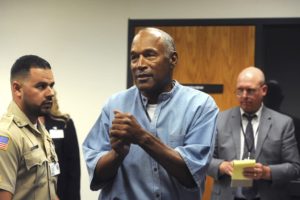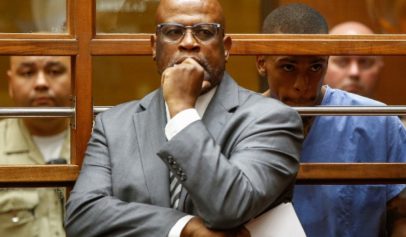
former NFL football star O.J. Simpson reacts after learning he was granted parole at Lovelock Correctional Center in Lovelock, Nev. Nevada’s(Jason Bean/The Reno Gazette-Journal via AP, Pool, File)
CARSON CITY, Nev. (AP) — Nevada’s parole board didn’t consider O.J. Simpson’s 1989 conviction for misdemeanor spousal abuse when it granted him parole in July because the case wasn’t listed in the national clearinghouse of FBI crime data, an official said Tuesday.
David Smith, the board’s hearing officer, said the panel requested a second report from the FBI’s National Crime Information Center on July 31 to determine whether an error had been made.
“Even as of today, we have not been given any formal notice that the charges back in 1989 resulted in a conviction,” Smith said.
He said it was impossible to know whether the decision to grant parole to Simpson might have been different if the board had considered the abuse conviction.
The disclosure came as a Nevada lawmaker proposed legislation requiring the board to consider an inmate’s domestic violence history before granting parole.
Assemblywoman Lisa Krasner, a first-term Reno Republican with a law degree, said the measure “isn’t specifically tailored” toward Simpson, who has served nine years of a 33-year sentence for armed robbery and is eligible for parole Oct. 1.
“This won’t affect O.J. Simpson but it will affect future people who are trying to get out on parole,” Krasner said about the bill to be formally introduced when the bi-annual Legislature reconvenes in January 2019.
Simpson was previously acquitted of murder in the 1994 killings of his ex-wife Nicole Brown Simpson and her friend Ronald Goldman.
The parole board said it wouldn’t consider a subsequent $33 million civil judgment that found Simpson liable for the deaths.
Krasner’s bill would require the board to set specific standards in cases where an inmate seeking parole was held responsible for a wrongful death of another person and punitive damages were awarded.
Attorney Gloria Allred, who appeared at a news conference with Krasner, said the parole board could have questioned Simpson about the abuse incident because it was presented as evidence during the murder trial.
“If anybody would have Googled that … it would have been easily available,” Allred said. “It has never been a secret.”
Police reported they arrived at Simpson’s Los Angeles home on New Year’s Day 1989 to find his ex-wife screaming, “He’s going to kill me!” Officers said she had a cut lip, swollen and blackened left eye and cheek, and a handprint on her neck.
The measure also would require those seeking parole to sign a sworn statement that all information they provide to the board is true. If Simpson was required to testify under such conditions, he couldn’t have told the commissioners he had “spent a conflict-free life,” Allred said.
Liz Martinez, a spokeswoman for Los Angeles County Superior Court, confirmed Tuesday that the spousal abuse conviction was not expunged and remains unsealed in a court database. Under California law, pleading no contest is considered a conviction.
The FBI, which maintains the electronic clearinghouse, said submissions by local law enforcement “is primarily voluntary, not compulsory.”
Because laws differ among states about what information should be provided, “information can sometimes be missing from a person’s record maintained by the FBI,” said Stephen Fischer, a spokesman for the FBI’s Criminal Justice Information Services Division.
Malcolm LaVergne, Simpson’s lawyer in Las Vegas, downplayed the abuse case as “more in the nature of a traffic ticket than a serious crime.” He noted that it was handled in municipal court, without Simpson present.
“The fact that Simpson was not present at the plea hearing is critical to understanding just how lightly this situation was treated, whatever your position is on Simpson or issues of domestic abuse,” LaVergne said in an email.


